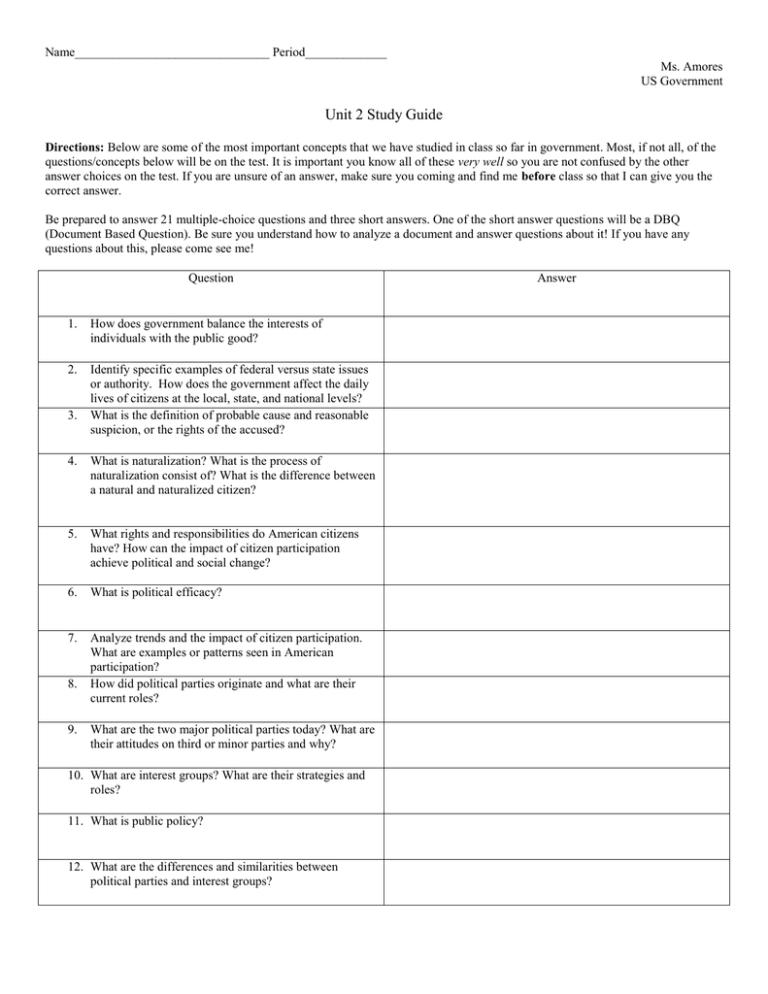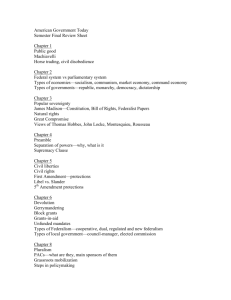unit_2_review51
advertisement

Name_______________________________ Period_____________ Ms. Amores US Government Unit 2 Study Guide Directions: Below are some of the most important concepts that we have studied in class so far in government. Most, if not all, of the questions/concepts below will be on the test. It is important you know all of these very well so you are not confused by the other answer choices on the test. If you are unsure of an answer, make sure you coming and find me before class so that I can give you the correct answer. Be prepared to answer 21 multiple-choice questions and three short answers. One of the short answer questions will be a DBQ (Document Based Question). Be sure you understand how to analyze a document and answer questions about it! If you have any questions about this, please come see me! Question 1. How does government balance the interests of individuals with the public good? 2. Identify specific examples of federal versus state issues or authority. How does the government affect the daily lives of citizens at the local, state, and national levels? What is the definition of probable cause and reasonable suspicion, or the rights of the accused? 3. 4. What is naturalization? What is the process of naturalization consist of? What is the difference between a natural and naturalized citizen? 5. What rights and responsibilities do American citizens have? How can the impact of citizen participation achieve political and social change? 6. What is political efficacy? 7. Analyze trends and the impact of citizen participation. What are examples or patterns seen in American participation? How did political parties originate and what are their current roles? 8. 9. What are the two major political parties today? What are their attitudes on third or minor parties and why? 10. What are interest groups? What are their strategies and roles? 11. What is public policy? 12. What are the differences and similarities between political parties and interest groups? Answer Name_______________________________ Period_____________ 13. What role do interest groups, political parties, media, and individuals play in determining and shaping public policy? 14. What are the democratic and political principles of federalism and separation of powers? 15. What are the different types of minor parties? 16. Evaluate the processes and results of an election at the state or federal level. 17. What is the most common form of political participation in the United States? 18. What is the media’s most common attitude toward the government? 19. What are the different biases and level of factual accuracy present within the media? 20. How has the media changed or evolved over the years? How has this evolution affected American politics? 1. Important Vocabulary: 2. Political Party: 3. Splinter Party: 4. Economic- Protest party: 5. Ideological Party: 6. Single- Issue Party: 7. Interest Group: 8. Federalism: 9. Media: 10. Election: 11. Rights: 12. Naturalization: 13. Yellow Journalism: 14. Investigate journalism: 15. Republican: 16. Democrat: 17. Liberal: Name_______________________________ Period_____________ 18. Conservative: 19. Lobby: 20. Pluralism: 21. Political Efficacy: 22. Public policy: 23. Associated Press: 24. Bill of Rights: (HAVE THIS MEMORIZED) 1st Amendment (5 Parts!): ____________________________________________________________________________________ __________________________________________________________________________________________ __________________________________________________________________________________________ ______________ 2ndAmendment:_____________________________________________________________________________ __________________________________________________________________________________________ __________________________________________________________________________________________ 3rdAmendment:_____________________________________________________________________________ __________________________________________________________________________________________ __________________________________________________________________________________________ 4th Amendment:_______________________________________________________________________________ __________________________________________________________________________________________ __________________________________________________________________________________________ _________________ 5th Amendment:_______________________________________________________________________________ __________________________________________________________________________________________ __________________________________________________________________________________________ _________________ 6th Amendment (3 parts):____________________________________________________________________________________ __________________________________________________________________________________________ __________________________________________________________________________________________ _______ 7thAmendment:_____________________________________________________________________________ __________________________________________________________________________________________ __________________________________________________________________________________________ 8th Amendment:_______________________________________________________________________________ Name_______________________________ Period_____________ __________________________________________________________________________________________ __________________________________________________________________________________________ 9th Amendment:_______________________________________________________________________________ __________________________________________________________________________________________ 10th Amendment:______________________________________________________________________________





